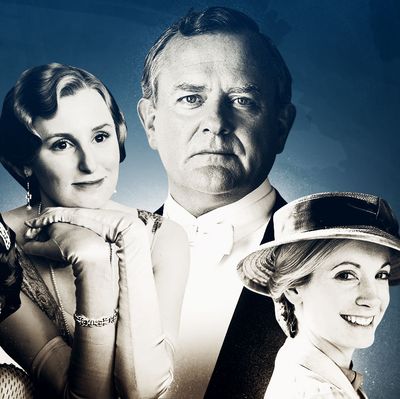
Downton Abbey begins airing its sixth and last season January 3 on PBS. Ahead of the final episodes, Vulture asked some of the cast to reflect on how their characters have changed over the years, their earliest memories on set, and why the show has been such a runaway success in the U.S.
Hugh Bonneville (Robert Crawley)
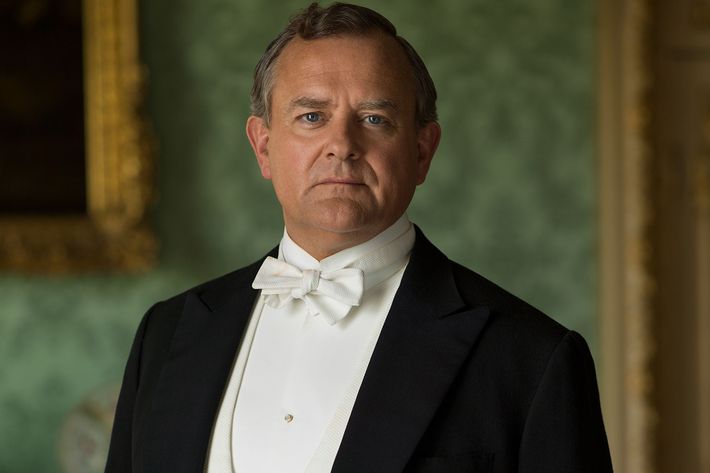
Do you remember your first day on the Downton Abbey set?
My first memory is the first time I worked with Maggie [Smith]. We did a scene in which sheÔÇÖs decrying the advent of electricity in the house. I think in the stage direction it said, ÔÇ£She shields her eyes from the light and says, ÔÇÿOh, itÔÇÖs like being on stage at the Gaiety Theater.ÔÇÖÔÇØ But she didnÔÇÖt just shield it with her hand, she pulled out a fan and then held it there for the entire scene, which was just hilarious. I thought, I see, I see. ThatÔÇÖs what itÔÇÖs going to be like. SheÔÇÖs going to steal every single scene.
What has been the biggest change for your character, and how did it affect your understanding of him?
The great strength of Julian Fellows is writing ÔÇö letÔÇÖs remember we have one writer on this show, not a team. He knows all of these characters better than anyone. So when Robert started going off the rails a bit in the second series, and his desire was drawn to the maid because he felt that his status in the house was being undermined, lots of people were throwing bricks at the TV, saying, ÔÇ£Robert wouldnÔÇÖt do that.ÔÇØ But human beings are human beings, so what IÔÇÖve enjoyed is seeing those ebbs and flows of expectation in the character. You think youÔÇÖve got┬áthe characters. You think youÔÇÖve got them soused, and then they do something that surprises you. People may have loathed Thomas ÔÇö heÔÇÖs the baddie they love to hate. Then, as the series goes on, you begin to understand where these barbs and arrows come from. With Robert, sometimes IÔÇÖve been frustrated that heÔÇÖs become a complete dinosaur, his IQ seems to drop through the floor, and heÔÇÖs incredibly┬áinsensitive. Then there will always be something that is redemptive, and you think, heÔÇÖs not so bad after all. I love that because if you just played the same beat all the time, he would be very dull. HeÔÇÖs ultimately a good man. I think thatÔÇÖs true of all the characters: They are all trying to do good even if they do wrong things.
Do you think the fans are going to find this final season satisfying?
I think so, because one of the main tones of the final season is about the end of an era, and thatÔÇÖs indicated by the estate itself. ItÔÇÖs brought home in the first episode, when we learn about a neighbor of ours, a landowner, having to sell. We actually go to the house, and itÔÇÖs really brought home to Robert and the family that this is happening around us. ItÔÇÖs happening to one of our friends, and heÔÇÖs literally selling the family silver because he didnÔÇÖt manage the estate properly. ItÔÇÖs a wake-up call for Robert and Mary: ItÔÇÖs adapt or die, as has happened to so many big estates in Britain in that era, after the second World War, particularly. ItÔÇÖs the sense of things coming to an end. Having to downsize the staff, the house beginning to shut down. Will they survive? Will they have to sell, too? Time to say good-bye to some characters. There is a sense of farewell, but in a good, dramatic way.
Why do you think Downton broke through so much, particularly in the United States?
No idea. I genuinely didnÔÇÖt think it would travel. I thought it was so quintessentially British, and itÔÇÖs about such minutiae of social interaction, and British social interactions. Maybe thatÔÇÖs part of the reason, actually. If you create something thatÔÇÖs true to itself, and has an intrinsic sense of authenticity, then it doesnÔÇÖt matter if itÔÇÖs set in space or under the sea. If you believe the world and you believe the characters, and you care about their interaction, and you have story lines that engross you, then youÔÇÖre some of the way there. But then add to that extremely good production values, a very well-cast show, and that amazing, most important ingredient of all: luck.
What were your favorite moments to shoot?
We all love filming at Anet Castle, which is where we shot some of the season finale last year, and we shot some scenes there this year. The people there were just so amazingly generous with their time. And the vistas up there are astonishing. Particular scenes, I donÔÇÖt know. IÔÇÖve always loved the scenes with my daughters. When you have father-daughter moments, they are all quite special.
How do you move on from something as iconic as Downton Abbey?
I donÔÇÖt want to sound cynical, but IÔÇÖve been a jobbing actor for 25 years. This show happens to have been an extraordinary adventure for all of us. And then I go back to being a jobbing actor.
Laura Carmichael (Edith Crawley)
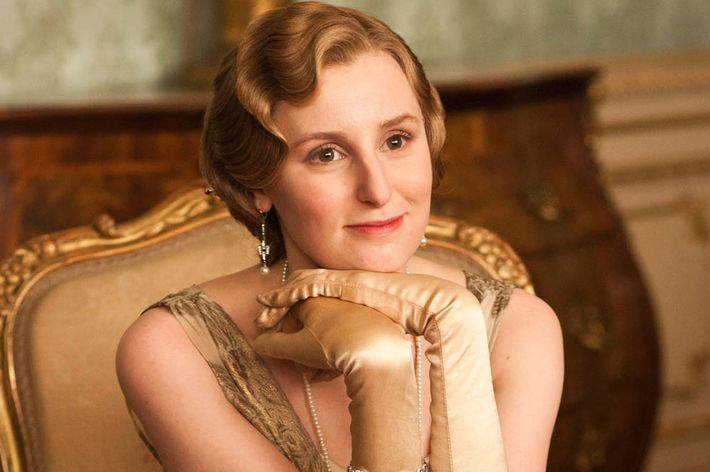
Do you remember your first day on the Downton Abbey set?
I do. I was so nervous. It was the first on-camera stuff I had ever done. I didnÔÇÖt really know what anyone was talking about and was trying to act like I did. It was a two-hander with Hugh [Bonneville], when we have a moment about Patrick dying in the Titanic. So it was an emotional scene. But Hugh is just so great, and made such an effort to put me at ease. I remember being incredibly grateful to him for being so lovely.
What has been the biggest change for your character, and how did it affect your understanding of her?
Well, I think she has responded to crappy luck with this energy of fighting back, and that has molded her into this really interesting character who is independent of the world she started in, which is,┬ámust find husband. I think that has been really interesting, and itÔÇÖs because of the era weÔÇÖre in, in terms of crossing the wall and what that did for women, and the opportunities it opened professionally for them. ThatÔÇÖs the push behind EdithÔÇÖs change. ItÔÇÖs great for me as an actress to look at those women who changed at the time.
Do you think that fans are going to be satisfied by this final season?
Yeah, yeah. There are some really amazing moments that pop up through the season, and the finale is great. WeÔÇÖre all going to be in bits.
Why do you think Downton broke through so much, particularly in the United States?
ItÔÇÖs a mystery, really. ThereÔÇÖs an element that feels like fantasy, but feels luxurious and beautiful and otherworldly. But, on the other hand, itÔÇÖs very much a workplace drama. ItÔÇÖs about working and living in this huge country house. That feels quite relatable, and I think itÔÇÖs the combining that feels good ÔÇö it feels like history, but itÔÇÖs a lot of characters doing a lot of salacious, twist-and-turn types of things. Then there are like 30 characters, so youÔÇÖre always going to like one of them.
What were your favorite moments to shoot?
There are a lot from this year, which I canÔÇÖt even talk about, but I like the flower show. It really cracks me up whenever I think of that day. By the time we got to the garden party, we knew that we were making something quite special. WeÔÇÖd seen like seven minutes cut together from the first few episodes, and the film looked fantastic. I remember watching that trailer and going back to my trailer, and I cried because I was like, ÔÇ£I think this is a big deal.ÔÇØ
How do you move on from something as iconic as Downton Abbey?
It will be really weird. As much as I say IÔÇÖll be sad about it, this is the right feeling to have at the end. ItÔÇÖs going to be a big change. I often think that when people say, ÔÇ£How does it feel? WhatÔÇÖs it like?ÔÇØ I donÔÇÖt think IÔÇÖm going to realize until afterwards. IÔÇÖve always said IÔÇÖm looking forward to being nostalgic about it┬ábecause┬áI know right now how wonderful┬áthis experience is, and yet, thatÔÇÖs it. IÔÇÖll feel that forever.
Joanne Froggatt (Anna Bates)
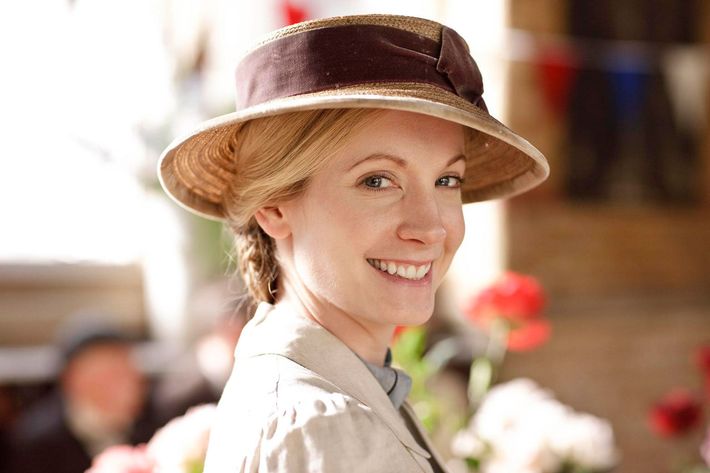
Do you remember your first day on the Downton Abbey set?
I do, actually. My very first day on the set was at Highclere Castle, so I remember pulling up the drive with the driver and seeing this looming castle and going, ÔÇ£Wow, theyÔÇÖve really gone all out here. This looks amazing. I think this is going to be really great.ÔÇØ And then, when I went inside, it was just so spectacular. It was quite awe-inspiring, that drive up to set that day. ItÔÇÖs something that sticks in my mind.
What has been the biggest change for your character, and how did it affect your understanding of her?
I donÔÇÖt feel thereÔÇÖs been a change in my character throughout the series, but thereÔÇÖs obviously been a change in her circumstances many, many times, and what that has brought out in her. I feel like she has gone from being a young woman to becoming a woman. SheÔÇÖs been through so much, and Anna and Bates have been through so much as a couple, that now we find her truly in adulthood.
Do you think the fans are going to find this final season satisfying?
I think so, yeah. Not all the loose ends are tied up, which I think is good, but I think we leave all the characters in a place that people will feel okay about.
Why do you think Downton broke through so much, particularly in the United States?
ItÔÇÖs a question that none of us really know the answer to. Obviously, Julian has created this world and this cross-section of characters. And I think there is somebody that everyone can connect with because there are so many different types of characters. And there are love stories, and people that are causing trouble for people. ThereÔÇÖs trauma and thereÔÇÖs drama. It is a true ensemble, and you start to care about everyone, and you start to care about this community. ItÔÇÖs a show that lots of generations can watch together. Maybe it was just the right show at the right time. Maybe itÔÇÖs just as simple as that. Who knows what that little bit of magic is that makes something go down as well as it has?
What were your favorite moments to shoot?
WeÔÇÖve had a┬álot of fun filming the servantsÔÇÖ hall scenes. And IÔÇÖve loved working with Brendan [Coyle] and Michelle [Dockery] and Phyllis [Logan]. Most of my emotional scenes are with them.
How do you move on from something as iconic as Downton Abbey?
ItÔÇÖs the life of an actor, really, to just always be moving forward. I donÔÇÖt think you really need to prepare yourself. WeÔÇÖre used to it. ItÔÇÖs how we live. I start a new job two days after we finish shooting, so my thoughts are already trying to prepare for that. ThatÔÇÖs all you can do, but I think weÔÇÖre ending it at the right time. IÔÇÖve got the best range of emotions I could wish for at the end. I will be sad. I will miss everybody. But I feel like itÔÇÖs time to move on. ThatÔÇÖs the perfect place to be, really.
Elizabeth McGovern (Cora Crawley)
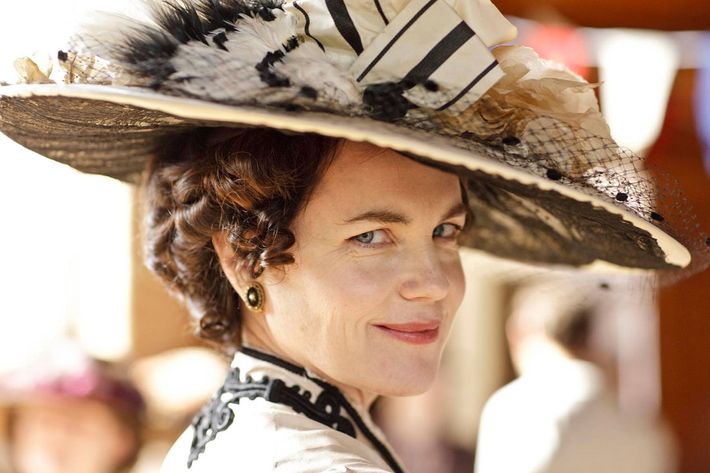
Do you remember your first day on the Downton Abbey set?
It was a scene with just Maggie and I. It must have been in Highclere Castle. It was in the drawing room, and she made me laugh all day. ThatÔÇÖs all I remember.
What has been the biggest change for your character, and how did it affect your understanding of her?
She has grown in confidence as the years have gone on. SheÔÇÖs more forthright with her opinions. SheÔÇÖs more willing to differentiate herself from her family and Robert in terms of who she is and what she wants. Particularly in the last year, she sort of inches towards becoming more of a modern woman, less self-effacing. ItÔÇÖs been slow and incremental.
Do you think the fans are going to find this final season satisfying?
I actually do think so. ItÔÇÖs a really hard thing to get right because you hope there will be a lot of expectation about how the show is going to end, and I feel that Julian has handled it incredibly well in the sense that he has given the audience the chance to say good-bye to every character. And you see a lot of characters that you were introduced to in the first season that you havenÔÇÖt seen in a really long time, which I love. The engine of the last series is saying good-bye to life, and itÔÇÖs historically accurate. And that sort of energizes it because there is really something big happening that fuels everything. I think it is quite satisfying.
Why do you think Downton broke through so much, particularly in the United States?
I had this theory that I tried out on somebody, and I quite liked it, so IÔÇÖm going to try it out on you. ItÔÇÖs that life today has become so confusing. WeÔÇÖre getting so much stimulus all the time. We have so much information, and to be able to turn back the dial and go back to a time┬áwhen┬áeverybody knew their place. Everything was simple. Life was slower. Things didnÔÇÖt change so quickly. There was a way things were done, and it was done over and over and over again. I think people find it relaxing. ItÔÇÖs an escape.
How do you move on from something as iconic as Downton Abbey?
ThatÔÇÖs a question IÔÇÖd be more equipped to answer when IÔÇÖve done it. I donÔÇÖt know what itÔÇÖs going to be like. ThereÔÇÖs always the fear, this dilemma of being an actor, that you dream to connect to a part in a way that the audience really identifies with and works for them, and you want it to take hold in the publicÔÇÖs imagination. But then you have to live with the curse that, possibly, they will have an association that will linger forever, and it will be more difficult for you to convince in other parts. Of course, most actors really want to do a variety of parts, because thatÔÇÖs why you want to become an actor in the first place, most of the time. So, itÔÇÖs a blessing and a curse. I donÔÇÖt know how itÔÇÖs going to play out.

